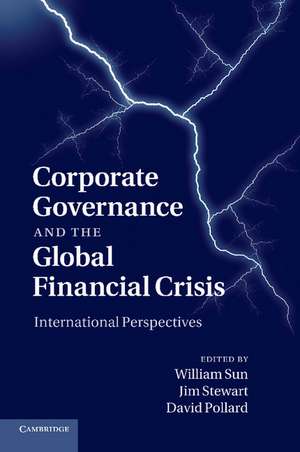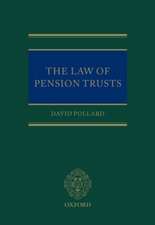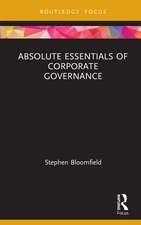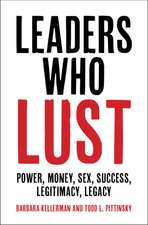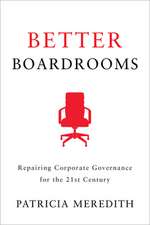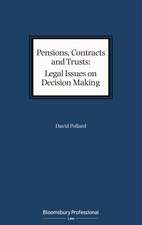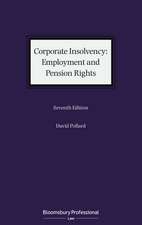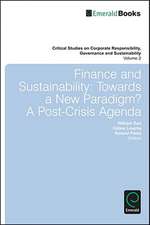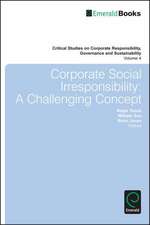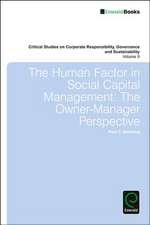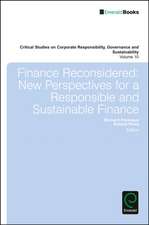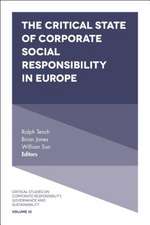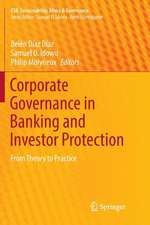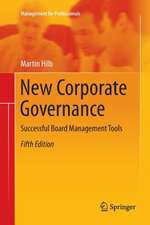Corporate Governance and the Global Financial Crisis: International Perspectives
Editat de William Sun, J. I. M. Stewart, David Pollarden Limba Engleză Paperback – 28 noi 2012
| Toate formatele și edițiile | Preț | Express |
|---|---|---|
| Paperback (1) | 379.88 lei 6-8 săpt. | |
| Cambridge University Press – 28 noi 2012 | 379.88 lei 6-8 săpt. | |
| Hardback (1) | 786.95 lei 6-8 săpt. | |
| Cambridge University Press – 20 iul 2011 | 786.95 lei 6-8 săpt. |
Preț: 379.88 lei
Nou
Puncte Express: 570
Preț estimativ în valută:
72.69€ • 76.10$ • 60.15£
72.69€ • 76.10$ • 60.15£
Carte tipărită la comandă
Livrare economică 05-19 aprilie
Preluare comenzi: 021 569.72.76
Specificații
ISBN-13: 9781107411715
ISBN-10: 1107411718
Pagini: 416
Ilustrații: black & white illustrations
Dimensiuni: 152 x 229 x 22 mm
Greutate: 0.55 kg
Editura: Cambridge University Press
Colecția Cambridge University Press
Locul publicării:New York, United States
ISBN-10: 1107411718
Pagini: 416
Ilustrații: black & white illustrations
Dimensiuni: 152 x 229 x 22 mm
Greutate: 0.55 kg
Editura: Cambridge University Press
Colecția Cambridge University Press
Locul publicării:New York, United States
Cuprins
List of figures; List of tables; List of contributors; Acknowledgements; Introduction: 1. Rethinking corporate governance: lessons from the global financial crisis William Sun, Jim Stewart and David Pollard; Part I. The Failure of the Market Approach to Corporate Governance: 2. Corporate governance causes of the global financial crisis Thomas Clarke; 3. The failure of corporate governance and the limits of law: British banks and the global financial crisis Roman Tomasic; 4. Where was the 'market for corporate control' when we needed it? Blanaid Clarke; 5. Information asymmetry and information failure: disclosure problems in complex financial markets Steven L. Schwarcz; 6. Finance, governance and management: lessons to be learned from the current crisis Roland Perez; Part II. Ownership, Internal Control and Risk Management: The Roles of Institutional Shareholders and Boards: 7. A review of corporate governance in UK banks and other financial industry entities: the role of institutional shareholders Robert A. G. Monks; 8. Ownership structure and shareholder engagement: reflections on the role of institutional shareholders in the financial crisis Roger Barker; 9. Board challenges 2009 Jay W. Lorsch; 10. Do independent boards effectively monitor management? Evidence from Japan during the financial crisis Chunyan Liu, Jianlei Liu and Konari Uchida; 11. Risk management in corporate law and corporate governance Christoph Van der Elst; Part III. Post-Crisis Corporate Governance: The Search for New Directions: 12. Corporate governance, capital market regulation and the challenge of disembedded markets Peer Zumbansen; 13. The focus of regulatory reforms in Europe after the global financial crisis: from corporate to contract governance Florian Möslein; 14. The great recession's impact on global corporate governance James Shinn; 15. Corporate governance in the Islamic finance industry and mitigation of risks in the post global financial crises Nasser Saidi; 16. A holistic approach to corporate governance: lessons from the financial crisis and the way forward Suzanne Young and Vijaya Thyil; Index.
Recenzii
Review of the hardback: 'There is no doubt about the timeliness and relevance of this book. Practitioners, supervisors, regulators and those teaching or studying corporate governance would all gain from reading it. I am particularly impressed by the breadth of the analysis and the choice of contributors. It is essential that potential reforms should be based on as clear an understanding as possible of the nature of the relationship between corporate governance and the financial crisis. The introduction to the book alone should be compulsory reading for those concerned with shaping the future of corporate governance in a world-wide context.' Sir Adrian Cadbury, Honorary Professor, Aston Business School
Review of the hardback: 'Did poor corporate governance contribute to the global financial crisis? The OECD and the UK regulators felt that existing corporate governance codes were adequate: the problem was a failure to implement them. In this book, twenty-two leading scholars and leaders of corporate governance thinking take a different view. Deregulation prompted high risk taking; boards failed to understand their exposure to strategic risk; and rating agencies, paid by those they rated, were outpaced by financial innovation. Over-incentivized bank executives pursued vast securitization, high leverage and excessive risk to the ultimate detriment of everyone else. The theme emerges that the Anglo-American corporate governance paradigm, particularly as adopted in the US, gives CEOs excessive power and wealth to the shareholders' detriment. New directions are needed. This work offers some new thoughts and options.' Bob Tricker, author of Corporate Governance: Principles, Polices and Procedures, 2nd edition
Review of the hardback: 'Did poor corporate governance contribute to the global financial crisis? The OECD and the UK regulators felt that existing corporate governance codes were adequate: the problem was a failure to implement them. In this book, twenty-two leading scholars and leaders of corporate governance thinking take a different view. Deregulation prompted high risk taking; boards failed to understand their exposure to strategic risk; and rating agencies, paid by those they rated, were outpaced by financial innovation. Over-incentivized bank executives pursued vast securitization, high leverage and excessive risk to the ultimate detriment of everyone else. The theme emerges that the Anglo-American corporate governance paradigm, particularly as adopted in the US, gives CEOs excessive power and wealth to the shareholders' detriment. New directions are needed. This work offers some new thoughts and options.' Bob Tricker, author of Corporate Governance: Principles, Polices and Procedures, 2nd edition
Descriere
This book provides critical insights on the systemic failures of corporate governance linked to the global financial crisis.
